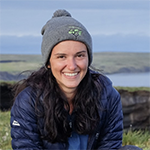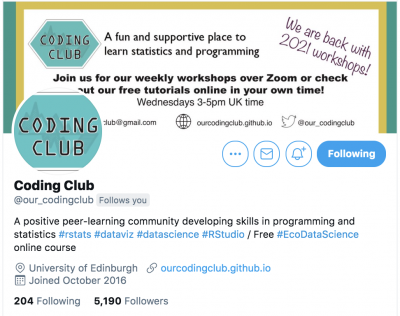Reaching further with online data science workshops - tips from a year of virtual Coding Club
Reaching further with online data science workshops - tips from a year of virtual Coding Club
Posted on 14 June 2021
Reaching further with online data science workshops - tips from a year of virtual Coding Club
Coding Club teaches quantitative skills to people at all career stages working inside and outside academia. We focus on trying to overcome "code fear" - the fear of programming, and "statistics anxiety" - the worry about a lack of quantitative skills. These can prevent people from engaging with the development of quantitative skills.
Our aim is to promote a fun and supportive environment where people can acquire the skills they need to answer their research questions or to progress with their careers either inside or outside academia.
We want to step away from labels such as “hard” or “only for those good at maths” and encourage people to learn up to their desired level without the pressure of assessments or a strict curriculum. For the last five years, we have been posting our tutorials online and we have also developed a free self-paced course with support from the DataLab. So online teaching was always a big part of our initiative, but it wasn’t until last year that we had to adapt to leading all of our workshops online. Here are some of the things we have learned.
1. Human connections are still key to engagement and learning
One of the key aspects of Coding Club that attracted people to our in-person workshops was the friendly environment, the casual workshop delivery style and the approachability of the tutors. And that continues to inspire people to join our workshops week after week. Seeing a supportive face on the screen, just knowing that someone is there to help should you need it, and knowing you are not in this steep data science learning curve alone helps people develop confidence.
Checking how people are doing either verbally or through the chat, sharing the answer to some of the common questions with everyone, discussing coding issues both one-on-one and in a small group - all of that gives people the chance to engage with the workshop content on a more personal level. And speaking of the humans behind all these workshops, team spirit and coordination are key. Tutors chatted with each other on Teams (trying to do private messages on Zoom is frustrating and more time consuming), helped with troubleshooting and when someone didn’t know the answer to a given question or problem, the other tutors would pitch in to help.
2. A mix of big group and small group time works well
At the start of our workshops we do a little presentation that focuses on the benefits of the skills the workshop will teach. The idea is to communicate why people should be excited for the workshop ahead and how it can help them, versus focusing on nitty gritty code details - that is what the rest of the workshop is for. Since our tutorial materials are all online, we don’t need to share screens, instead people go through the tutorial at their own pace. For the practical parts of the workshop we split people into small groups, each with one or two tutors. People do the tutorial and use the chat for questions or just discuss them verbally.
To have something fun at the end of the workshop too, we have been doing little five-minute or less quizzes, nothing complicated, just an opportunity to highlight a few key points. If the workshops were entirely in breakout rooms, then people could miss out on tips or content that has been discussed in the other rooms. If everything takes place in the big group, then it can be more intimidating to ask questions. Having a bit of both has worked out well for Coding Club.
3. Organising workshops in different parts of the year attracts a more diverse audience
Obviously that is also true for different time zones, but that can be more challenging depending on where people live. For a series of workshops, there is a benefit to having a structure. For example Coding Club workshops take place on Wednesdays, always at the same time. However, when we entered the second semester we noticed that there were more professionals/later career folk coming to our workshops, people from other disciplines. As deadlines for dissertations and research projects approached towards the end of the semester, the undergraduate and postgraduate students became the dominant audience again. Some people don’t have the capacity to engage with workshops in certain parts of the year. By repeating some of the key workshops and having content throughout the academic year, we can reach a larger and more diverse audience.
It has been incredibly inspiring for our team to see so many people engage with our online workshops and we are looking forward to more workshops in the autumn! Until then, you can find all of our tutorials on our website and carry on your data science journey!
*MILESTONE!*
We are over 5000 here and we are so happy we can do this! Especially in these hard times, it would not happen without YOU, your questions, and energy! Here are some interesting things that happened THIS semester! Thank you for growing with us! #coding #DataScience pic.twitter.com/NQ8ZPUENxB


 By
By